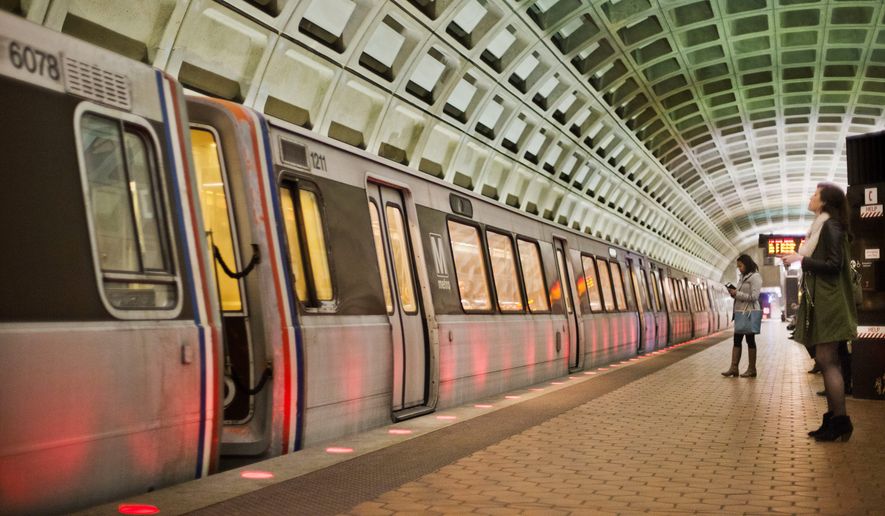Metro faces an $18 billion capital deficit over the next 10 years, news that shook regional lawmakers and prompted one to suggest privatizing the long-troubled transit agency.
In addition, the Federal Transit Administration ordered Metro to make immediate repairs to prevent fires on the subway system’s tracks, just days after issuing a safety directive with a threat of defunding and closures. The directive capped a week in which Metro’s new general manager laid out his plan for major repairs a day after the subway had suffered its eighth serious smoke-and-fire incident in two weeks.
At Wednesday’s meeting of the Metropolitan Washington Council of Governments (COG), Metro Board Chairman Jack Evans told lawmakers about the $18 billion deficit the transit agency anticipates in its capital budget over the next decade. He pleaded with them to pressure the federal government to step up its contribution to the rail system’s operating costs, adding that little else can be done to improve Metro’s financial situation.
“I can’t even take this thing and put it into bankruptcy because there’s no law that covers this,” he told the group.
Mr. Evans, who was elected chairman of the Metro Board of Directors in January, also noted that maintenance costs will total $10 billion over the next 10 years.
“We have no way of paying for that. Nothing,” he said. “The finances are worse than the operations.”
COG Vice Chairman Matthew F. Letourneau suggested privatizing the system as a major step to fix Metro’s financial mess.
“I haven’t heard that kind of discussion from the Metro Board,” said Mr. Letourneau, a Republican on the Loudoun County Board of Supervisors. “We just heard everybody talking about how Metro can’t fail and that it’s the spine of the region, so that needs to be on the table.”
Mr. Evans, a Democrat who represents Ward 2 on the D.C. Council, said that privatizing some parts of the regional subway system could happen but that it isn’t likely.
What’s more, he said it’s going to cost about $3 billion to replace the aging railcars with the new 7000 series.
“If you want to see an original rail car from Metro in 1976, you think you’d go to the Smithsonian,” Mr. Evans said. “No, go to Metro; we’re still running them.”
Shortfalls in Metro’s revenue from fares and advertising are covered by contributions from the jurisdictions it serves in the District and its suburbs in Maryland and Virginia. The federal government finances Metro’s capital construction projects at $150 million a year, but it does not provide any funds for operations.
Funding for maintenance varies, with the District providing about $312 million for fiscal 2016 — the most of any jurisdiction in the region. In Maryland, Prince George’s County gave $180 million and Montgomery County $139 million. In Virginia, Fairfax County provided $118 million, Arlington County $58 million, Alexandria $34 million, and Falls Church and Fairfax City each gave $2 million.
Persuading regional lawmakers to donate more tax dollars to Metro could be difficult, and Mr. Letourneau said Democrats and Republicans will have to put politics aside to solve the funding problem.
“They’re going to have to come to the table and have discussions that are politically uncomfortable for them if they want Virginia to be on board,” Mr. Letourneau said of his Democratic colleagues in Maryland and District. “If that’s what it’s going to take to fix Metro, I hope it’s not an insurmountable hurdle.”
Metro celebrates its 40th anniversary this year, having grown to 118 miles of track and 91 stations in that time.
Meanwhile, the Federal Transit Administration, which assumed oversight of Metro safety issues in October, directed the transit agency on Wednesday to repair three segments of its tracks immediately to minimize the risk of smoke and fire.
Metro spokesman Dan Stessel said the FTA order will require changes to the “SafeTrack” repair plan that Metro General Manager Paul J. Wiedefeld announced on Friday. The plan calls for early subway service closures and single-tracking of commuter trains, as well as shutting down track segments for weeks at a time.
The FTA directive also orders Metro to reduce power flowing through the subway’s electrical cables, and Mr. Stessel said that transit officials have implemented new speed limits on trains in the system’s core in downtown Washington.
Metro has long been plagued by smoke incidents that have endangered passengers, delayed schedules and raised concerns about the subway system’s safety and reliability. The most infamous occurred in January 2015, when a passenger was killed and 86 others were injured in a smoke-filled tunnel at the L’Enfant Plaza station. In March Metro officials shut down the entire system for 29 hours to inspect power cables along the tracks.
COG Chairman Roger Berliner, who also serves on the Montgomery County Council, said the organization’s members need to come together to find a solution.
“We are completely committed as a region to doing what we must do to support this unbelievably important organization,” Mr. Berliner said. “We cannot wait to step in here, so we will be working very hard with our business community and legislators to come up with funding mechanism.”
• Ryan M. McDermott can be reached at rmcdermott@washingtontimes.com.




Please read our comment policy before commenting.